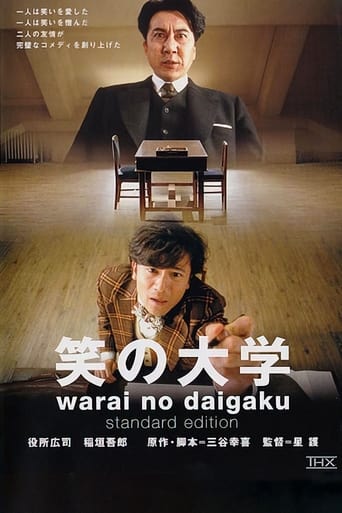Cat Mouse
On 1940, Japan is in war. The all play is banned by government. When dramatic company wants to do play, their script have to be inspected by the police. In this age, there are two men. One is Kosaka, he have never laughed since he was born. Another one is Tsubaki, he is a playwright writing for "Dramatic Company of Laughs". They meet in the investigation room. Kosaka demands to Tsucaki to rewrite script exceot laughs. The main characters are only two. Kosaka and Tsucaki. Main set is the investigation room. They persuade each other for 7 days. Original story was made by Koki Mitani. He is playwrightm scriptwriter, film director and stage director. Originally, this story is a stage play. That's why, even only investigation room, the story can be very funny. Especially, Kosaka, Koji Yakusho is acted, his action is very good. How he is changed by Tsubaki is great. This movie break old movie's stereotype.
cledorurun
In Showa era, before the World War 2, a prosecutor named Sakisaka and a dramatist named Tsubaki meets in an investigation room of the metropolitan police department. At first Sakisaka tries to prevent Tsubaki's theatrical company "University of Laughs," but as they rewrite the script, Sakisaka comes to enjoy the rewriting with Tsubaki…This movie is almost composed of the conversations of the two and the situation hardly changes from the investigation room. Thus, some people may think this movie do not have passionate scene and the images are boring. On the other hand, the two actors play the contrastive characterized men. I think it great that their conversations which draws the attentions of the audience. Tsubaki has a ready wit and promptly thinks of the lines which are full of humor. The humor which Tsubaki think every time made me laugh. I was also impressed with the set of the structure. Actually they are buildings now exist, they looks like the real Tokyo in the beginning of Showa era.
anandserpi
Writing comedy is hard, especially, if you have to face an authoritarian, ex-soldier censor officer who never laughed all his life and was proud of it. That's the premise of this extraordinary movie which is set in Japan during WWII. It is originally a play, so we can hope for tons and tons of witty dialogs between the young playwright and the censor officer. The former is struggling to get approval of his next comedy script while the latter is determined to close down all theater performances in the city, simply because "…it is inappropriate to get a few laughs during this time of war…" Then, suddenly, the movie turns into a lesson of how to write a good comedy as the censor officer keeps criticizing the script and demands changing. There are lots of warm and funny moments, but toward the ending, it suddenly becomes tense and heartbreaking. It almost becomes a tragedy. The whole movie is basically played by those two characters. Other characters can easily be extras. The setting is very minimalist as nearly 80 percent of the movie is located inside the interrogation room. The message we can get from this movie is that there is always comedy inside anybody's life, whether you want it or not. It is no use denying it. Just as it is no use denying not to like this incredible movie once you see it.
kevbee
Cinema doesn't get much better than this. Adapted from the successful 1996 play by Koki Mitani, Warai no Daigaku (University of Laughs) directed by Mamoru Hoshi was an audience hit at its premiere at the Tokyo International Film Festival. It's not hard to see why.Set in pre-WW2 Japan, the story focuses on a young playwright's attempt to get his comedy script approved by a deeply humourless government censor. As the two men work with and against each other, the script changes and evolves - with unexpected results.The film is essentially a two-hander (the director has done little to disguise that this was initially a stage play) and the two leads are brilliantly played by Koji Yakusho (Shall We Dansu?) as the censor and Goro Inagaki as the jittery writer.It is said that there is a fine line between comedy and tragedy. This film treads that line with a light step. The result is a near perfect film that is funny yet also poignant, touching and genuinely moving. Let's hope Hollywood doesn't decide to remake it.


